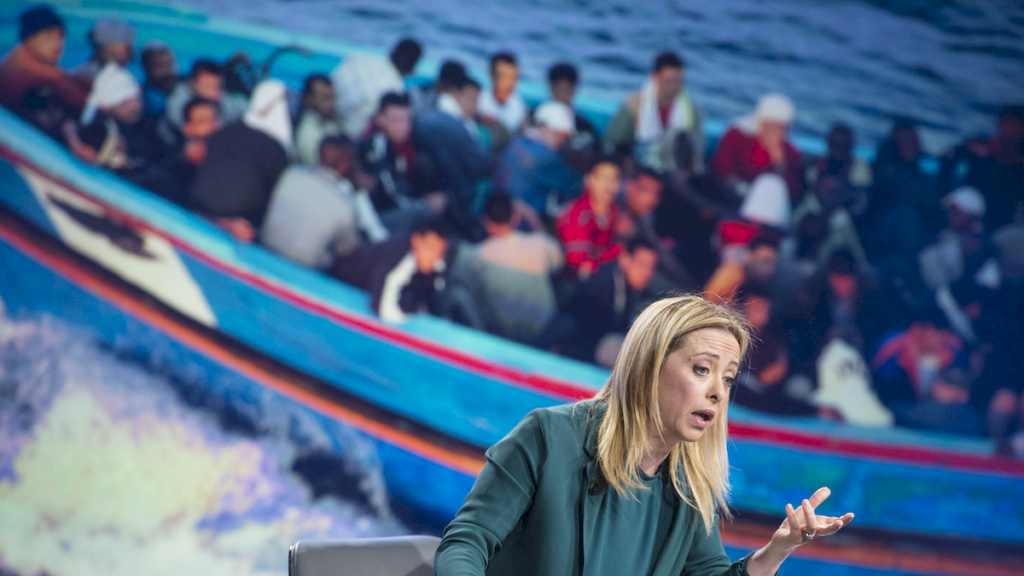The ship is docking in the Albanian port of Shengjin Italian Navy ship Libra with i. on board first 16 migrants (10 Bangladeshis and 6 Egyptians) intercepted a few days ago in international waters south of Lampedusa. A two-day journey that, including fuel and crew, cost our coffers approximately 200 thousand euros. The migrants will be identified and subjected to the procedures for requesting asylum in the Gjader facility, 20 km from the coast, where they will be the first guests. The deterrent effect entrusted to the center in Albania (maximum capacity no more than 3 thousand people for a cost of over 700 million euros) which the Italian Government has repeatedly called for does not seem to have worked if it is true that in the last few hours another thousand migrants have landed in Sicilian ports.
And yet, the Italy’s “innovative” solution for centres outside the European Union, despite the numerous doubts on the lack of protection of migrants’ rights, is gaining more and more sympathy in Brussels. A change of direction that the Melons he immediately understood and which he now intends to ride to stop new departures of migrants on our coasts.
Meloni and her allies: a summit for migration solutions
Together with the Danish Prime Ministers Puts Frederiksen, and Dutch Dick Schoof, la Melons promoted a meeting informal between some of the Member States most interested in the migration dossier and “in particular in the issue of innovative solutions”. The meeting will take place in the premises of the Italian delegation at the Europa Building on Thursday 17 October morning before the start of the work of the European Council. “The aim of the meeting – explained Italian sources – is to coordinate the mutual positions in view of the strategic discussion planned between the leaders as well as to examine in depth the different lines of work on which to focus in order to strengthen and make the European Union’s migration policy increasingly effective”.
Costs and benefits: Meloni reveals the true price of the Albanian deal
Yesterday, Meloni illustrated the Italian position in Parliament in view of the European Council, denying the news that gave the cost of the agreement with Albania in about one billion euros. “The protocol with Albania costs 670 million, or 134 a year – Meloni specified – in the Italian reception system they are about 7,5% of what we spend every year to welcome the immigrants who land here, which is almost 1,8 billion euros”.
The expulsion centres outside the EU do not displease the President of the European Commission either, Ursula von der Leyen according to which “the EU should consider legislating on repatriation centres in third countries to speed up the expulsion of illegal immigrants”. This is what von der Leyen writes in a letter to the capitals ahead of the EU leaders’ debate on immigration planned at the European Council. “The EU – argues the president of the European executive – is not effective in expelling people who arrive illegally. Only one in five non-EU citizens who were ordered to leave did so. To address this problem, a new legal framework is needed to strengthen our ability to act”.
For von der Leyen, “revisiting the EU’s failed 2018 effort to align deportation policies would be an immediate priority for the incoming immigration commissioner.”
Expulsions or reception? The EU Commission in the spotlight
In short, the proposal for centres in third countries, along the lines of the Italian protocol with Albania could mark an epochal turning point in the EU migration policies. Last week the Commissioner for Internal Affairs, ylva johansson he played down the prospect of deportation camps, adding that “no one has formally proposed it.” But now von der Leyen points to the Italian initiative as an opportunity to “draw lessons from this experience in practice.”
The Commission had already deemed this type of offshoring substantially contrary to EU law in 2018. And in 2022, Johansson herself had expressed herself firmly on the United Kingdom’s plan to deport people to Rwanda: “Sending asylum seekers more than 6.000 kilometers away and externalizing asylum procedures,” the commissioner said, “is not a humane and dignified migration policy.”
Migration Emergency and Returns: Poland and the Border Dilemma
In a first draft of the conclusions of the next European Council, EU leaders seem intent on calling for “determined action at all levels to increase and accelerate” deportations. But the innovative solutions proposed by Italy will perhaps have to give way to a much more immediate emergency that is intertwined with the Ukrainian crisis, namely the Poland’s decision di close the border with Belarus to refugees who are dumped on European soil in a sort of “hybrid war” that uses migrants to destabilize the European Union’s border countries. This week Warsaw doubled down on plans to push back asylum seekers pushed over the border but Brussels warned that Warsaw’s move is almost certainly incompatible with EU rules. “Member States,” the Commission noted, “must address provocations from Belarus and Russia without compromising our values.” But already the Finland earlier this year he extended its border closure indefinitely with the RussiaLatvia, Lithuania and Estonia have left the option open and may follow the same path.
Source link : http://www.bing.com/news/apiclick.aspx?ref=FexRss&aid=&tid=670f5ce369114b93ae4992e39126836e&url=https%3A%2F%2Fwww.firstonline.info%2Fen%2Fmigrants-meloni-seeks-new-allies-in-europe-for-innovative-solutions-like-albania%2F&c=12615730222879471389&mkt=de-de
Author :
Publish date : 2024-10-15 23:12:00
Copyright for syndicated content belongs to the linked Source.
